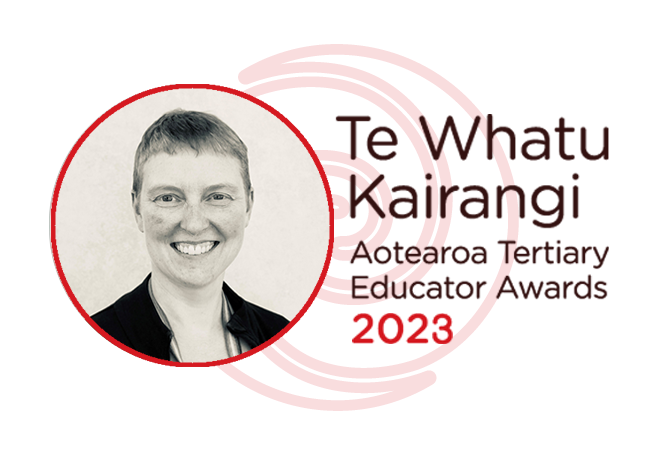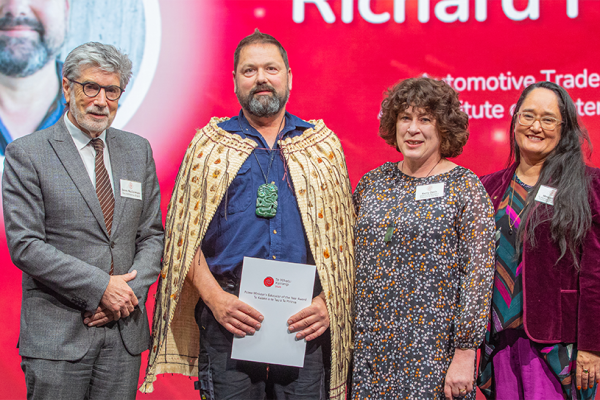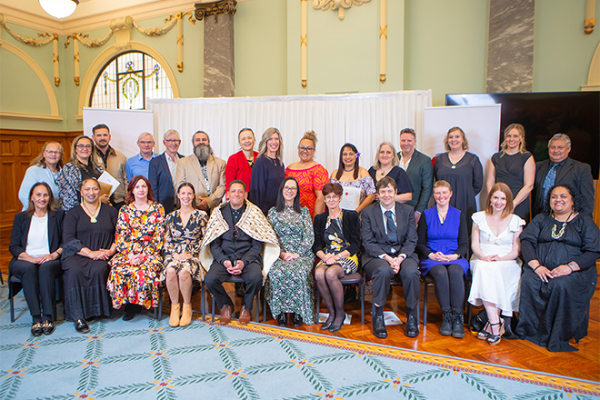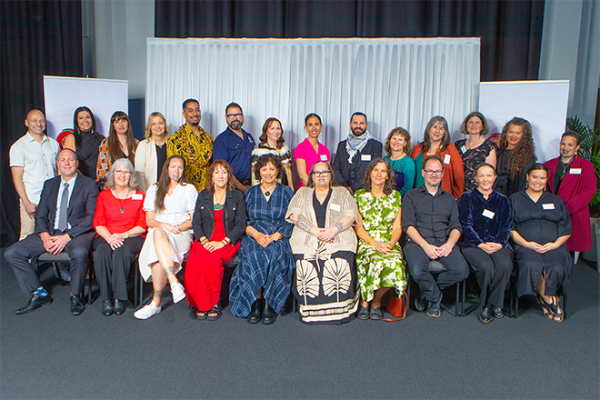Professor Philippa Martin
Transforming engineering education for student, institution and community benefit
Category Winner | Progressing seamless ākonga transitions between contexts
Electrical and Computer Engineering, Te Whare Wānanga o Waitaha | University of Canterbury
Watch Professor Philippa Martin's Teaching profile video
“Engineers cannot solve problems they cannot see and therefore having a diverse engineering workforce is important to achieve more equitable outcomes for all.”
Eight years ago, one of Philippa’s students in the Electrical and Computer Engineering (ECE) department at the University of Canterbury (UC) revealed that she had experienced harassment from some of her male peers. Listening to her speak, Philippa was taken back to the early 90s when she had been an ECE student at UC. She remembered the shock of coming from an all-girls’ high school to an (almost) all-male environment where she too was harassed by the male students.
She reached out to the Women in Engineering ProActive Network (WEPAN) and the University of Colorado Boulder researchers working on improving the climate for under-represented engineering students. This started her research into diversity, equity, and inclusion (DEI), which led to her spearheading a series of initiatives at UC aimed at transforming the Engineering culture so all students could belong and succeed.
Over 80% of UC’s Engineering students were male, predominantly Pākehā school-leavers from high-decile schools. The Engineering Student Society reinforced the ubiquitous stereotype of the Engineering student as a beer-drinking, sausage-eating alpha male, thereby marginalising Māori students, Rainbow students, international students, neurodiverse students, non-school leavers, and women. She felt that a more diverse community of belonging needed to be created.
Philippa could see that to affect change, the culture of first-year Engineering needed to change. Her vision was that first-year students would go on to become mentors, tutors and professional engineers who would radiate a different set of values around inclusion. This vision aligns with the Tertiary Education Strategy’s (TES) call for education systems to adapt to the needs of varied learners and to empower them to achieve their goals.
“[Philippa] has been an inspiring role model and mentor for female engineering students to the extent of leading massive culture change, and has actively advocated for inclusion and under-represented groups in engineering.” (ECE Head of Department and Deputy Pro-Vice Chancellor, 2018-2022)
Holding the role of First-Year Dean of Engineering (2018-2021) enabled Philippa to focus on the transition of first-year students into Engineering. She formulated a strategy called “More than Numbers” aimed at improving the experience of all first-year Engineering students. The strategy aimed to bring humanity into the technical world by creating a culture of connection, belonging, and respect.
She worked in conjunction with colleagues from within Engineering and across campus to establish and lead a set of initiatives that upskilled staff on DEI and provided students with academic, pastoral, and peer support as they made their transition into university and their specialist discipline. She created a change community and empowered people to lead their own initiatives to advance DEI and improve first-year engineering student experience and success. Re-establishing a First-Year Engineering Board of Studies was crucial to address the lack of oversight and coordination across the Faculties of Science and Engineering.
She invented, co-designed, and implemented the ENG ME! peer mentoring programme, a student-led, faculty-enabled peer mentoring programme for all first-year Engineering students. Co-designing ENG ME! with student leaders, Māori, Pasifika, academic developers, and other experts across campus was crucial to making it NZ-relevant.
The goals of ENG ME! are to provide a space for whakawhanaungatanga, creating a sense of belonging and connection to UC Engineering, and to extend manaakitanga, providing direction, encouragement, motivation, friendship, and study support as students get established at university. Such is the success and merit of the programme that 200+ students applied to be mentors in 2022.
“ENG ME! has extended me as a person in ways I never thought possible. Mentoring a group of my peers was one of the most daunting things I have ever done and now [is] one of the things I am most proud of.” (Graduate ENG ME! mentor and mentor leader)
Philippa also knew that the culture change would only “stick” if it continued through the transition to the specialist years. An Ako grant enabled her to work with UC experts to create an orientation program for ECE which encouraged inclusive cohort formation.
Students beyond Engineering have also been impacted by this work. Engineering had the worst equity reputation on campus, but is now consulted by other faculties on DEI initiatives. They helped Law establish their Law ME! peer-mentoring programme, and advised Education, Arts and Business about developing similar programmes.
“Research conducted in the Faculty of Law identified that many of our first-year students struggled with transitioning from high school to university and making connections with their peers. We saw the ENG ME! programme as a proven way to address both identified issues.” (Law ME! academic lead, UC)
The culture change also needed to occur in how UC supported first year students through failure and academic warning processes. Working with staff in Engineering and Health Sciences, Philippa reimagined academic warning processes to focus on strengths and solutions, rather than deficits and problems. She role modelled a different way for engineers and leaders to communicate. This mahi (work) has led to a more supportive and mana enhancing approach to handling academic failure. Working with academic support staff she also led an overhaul of academic writing assessments to increase support of first-year students.
Reflecting on the deeply personal origins of her mahi, Philippa is grateful not only to have had the opportunity to lead the initiatives outlined above, but also to have played a role creating a culture where staff and students empower others. This mahi has changed how she sees the future of engineering culture and how she operates within it.
Philippa is no longer Dean, but the initiatives she implemented continue to function and evolve. ENG ME!, in particular, being student-led, changes each year, depending on the needs and strengths of each cohort. ENG ME! is thriving and has more fully evolved as a student-led entity, with mentor leaders now running the mentor training (rather than staff).
The fact the ENG ME! model has been replicated in other contexts proves its adaptability and relevance. More profoundly, the empowerment of student leaders through ENG ME! is sustained through to the professional context. The initiative is producing graduates who enter the workforce ready to replicate a culture in which they have a voice, in which they respect others and are respected, and in which they empower others to succeed because they themselves are empowered.
"I am trying to empower [mentors] to be the best leader and Mentors to their group. I'm not just mentoring students, but I am empowering students to do their job well.” (ENG ME! mentor leader)
In the same way that other Departments at UC have been inspired by this approach in tackling issues of equity, other academic institutions in New Zealand will, in becoming aware of this story, be invited to create their own ways of addressing these issues in their unique contexts.



